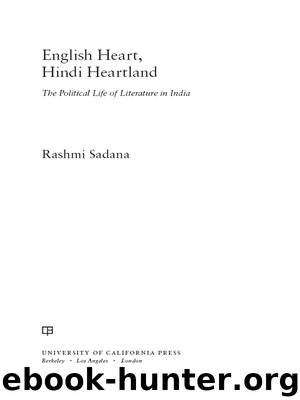English Heart, Hindi Heartland by Sadana Rashmi

Author:Sadana, Rashmi
Language: eng
Format: epub
Publisher: University of California Press
I long to build a palace
for these refugees among the tombs
I, who am yet to find my own house.
I stammer in broken words,
in distorted sounds from some other body.
Which of the three tongues I use
during the day is truly mine?
Or is it the pure language of mystery
I speak in dream at night?
Being in Delhi seemed to require a new spatial ordering of language, yet one that was not necessarily constant or predictable.
One significant change in Satchidanandan's home life in Delhi was that his family became a space of linguistic familiarity. Even in Kerala the question of the place of Malayalam in his own family's life was negotiated. He sent his children to Malayalam-medium schools rather than English-medium ones, which was to influence the kind of relationship to language—both Malayalam and English—his daughters had. One of them, T. P. Sabitha, went on to complete an M.Phil. in English. She, too, lives in Delhi and writes poetry in both Malayalam and English. She also teaches English literature at Delhi University's Hans Raj College. When we met from time to time in Delhi, it was clear that Sabitha had a breezier attitude to her own multilingual Delhi life as compared to her father's, even if she carried some angst about being the daughter of a literary giant. Being the child of a writer makes you a “late bloomer,” she explained one afternoon over tea, and then listed several of her friends who were also the sons or daughters of major writers and who had had similar experiences. She spoke of how she had the perfect mentor at home, yet that meant that she did not look for creative guidance outside her family. This turned out to be something of a struggle, especially when she first came onto the poetic stage when the family was still living in Kerala. She explained that when she was first published at the age of sixteen (in Kerala Kavita) people assumed her father had written the poems. The experience “scared” her, and she did not publish again (in the journal Malayalam) until she was twenty-four. “It was difficult to take yourself seriously as a writer,” she went on to say. “You always feel you have to live up to something.”
Now, in Delhi, Sabitha speaks Malayalam with her immediate family and mostly English and some Bengali with her husband, who is from a Bengali-speaking background. Of Malayalam, she said, somewhat sheepishly, “It is good to have a secret language.” But she also emphasized that her intellectual discourse was conducted almost exclusively in English. Even when speaking with her father, they seamlessly and unconsciously switch to English when discussing “ideas.” She could not pinpoint when it happened, only that it did, and then the switch back to Malayalam might occur, again, without either of them noticing.
Sabitha began writing in English when the family came to Delhi. She remarked that in English the audience or reader is “disembodied.” But she didn't seem troubled by this. For her the question of authenticity is an “ahistorical” one.
Download
This site does not store any files on its server. We only index and link to content provided by other sites. Please contact the content providers to delete copyright contents if any and email us, we'll remove relevant links or contents immediately.
4 3 2 1: A Novel by Paul Auster(12391)
The handmaid's tale by Margaret Atwood(7763)
Giovanni's Room by James Baldwin(7346)
Asking the Right Questions: A Guide to Critical Thinking by M. Neil Browne & Stuart M. Keeley(5774)
Big Magic: Creative Living Beyond Fear by Elizabeth Gilbert(5771)
Ego Is the Enemy by Ryan Holiday(5445)
The Body: A Guide for Occupants by Bill Bryson(5096)
On Writing A Memoir of the Craft by Stephen King(4942)
Ken Follett - World without end by Ken Follett(4731)
Adulting by Kelly Williams Brown(4574)
Bluets by Maggie Nelson(4555)
Eat That Frog! by Brian Tracy(4536)
Guilty Pleasures by Laurell K Hamilton(4448)
The Poetry of Pablo Neruda by Pablo Neruda(4106)
Alive: The Story of the Andes Survivors by Piers Paul Read(4031)
White Noise - A Novel by Don DeLillo(4009)
Fingerprints of the Gods by Graham Hancock(4004)
The Book of Joy by Dalai Lama(3986)
The Bookshop by Penelope Fitzgerald(3852)
